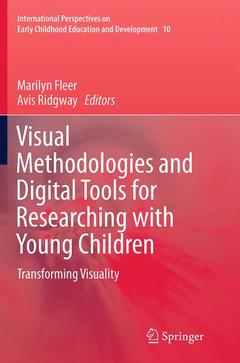Visual Methodologies and Digital Tools for Researching with Young Children, 2014 Transforming Visuality International Perspectives on Early Childhood Education and Development Series, Vol. 10
Coordonnateurs : Fleer Marilyn, Ridgway Avis

This book makes an original contribution to researching child-community development so that those with specific interests in early childhood education have new theoretical tools to guide their research practices. The book explicitly theorises the use of digital visual tools from a cultural-historical perspective. It also draws upon a range of post-structuralist concepts for moving research and scholarship forward. Examples of visual technologies from research in different cultural communities are foregrounded.
In particular this book introduces contemporary methodologies for researching child and community development with a focus on visual methodology so the dynamics of development can be captured over time and analysed historically, culturally, socially, ecologically and psychologically through a range of iterative techniques. Visual technology was not freely available in Vygotsky?s time for example, and therefore potentially represents an extension of his genetic experimental approach to researching child development.
The book presents a range of methodological arguments about research into child and community development through which new conceptions for research centred on young children have been created. The authors of the chapters also discuss why a more holistic, dynamic and ethical view of research is needed for generating new knowledge about child development in a range of cultural contexts.
?Section 1: Post-developmental Methodologies for Researching with Young Children.- 1. A Digital Turn: Post-developmental Methodologies for Researching with Young Children; M. Fleer.- Section 2: Cultural-historical Conceptualisations of Digital Visual Tools.- 2. Beyond Developmental Geology- A Cultural-historical Theorization of Digital Visual Technologies for Studying Young Children’s Development; M. Fleer.- 3. A Visual Dialectic Methodology - A Visual Dialectical Methodology: Using a Cultural-historical Analysis to Unearth the Family Strategies in Children’s Bilingual Heritage Language Development; L. Li.- 4. Past-present Dialectic- A New Methodological Tool for Seeing the Historical Dynamic in Cultural-historical Research; A. Ridgway.- 5. Intergenerational Family Dialogues; H. Monk.- 6. A Cultural-historical Framework for ‘Everyday’ Research: Theorising Development through Visual Imagery and Dialogue; S. Pennay.- 7. A Visual and Tactile Path: Affective Positioning of Researcher Using a Cultural-historical Visual Methodology; G. Quinones.- 8. Refocusing the Lens on Development - Towards Genetic Research Methodology; N. Veresov.- Section 3: Ethical and Conceptual Issues when Researching with Children Using Digital Visual Tools.- 9. Beyond Alienation: Unpacking the Methodological Issues in Visual Research with Children; J. Agbenyega.- 10. ‘Baby cam’ and Participatory Research with Infants: Opportunities, Constraints and Dilemmas– J. Sumsion and colleagues.- 11. The Ethics of Researching Young Children’s Play when Using Digital Visual Tools; H. Sorenson.- Section 4: Central Concepts for Researching with Young Children Using Digital Visual Tools.- 12. Method, Methodology, Methodological Thinking; N. Veresov.
Date de parution : 08-2016
Ouvrage de 238 p.
15.5x23.5 cm
Date de parution : 11-2013
Ouvrage de 238 p.
15.5x23.5 cm


